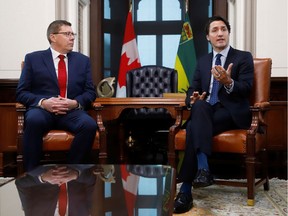The premier of Saskatchewan feels the province has no money owing to the feds despite no longer remitting carbon tax on natural gas for home heating.

Article content
Premier Scott Moe argues Saskatchewan has paid its taxes in full as the Canada Revenue Agency (CRA) prepares to audit the provincial government for not paying carbon levies on home heating.
“We are submitting the same amount of carbon tax on natural gas and electricity for residential home heating as the Trudeau government is collecting on home heating oil,” Moe said in a social media post Tuesday.
Advertisement 2
Article content
Article content
“So we consider ourselves paid in full.”
The post is a dig at the federal government‘s temporary exemption from fuel charges on home heating oil, which mostly benefits residents in Atlantic Canada. The three-year exemption was announced in October 2023, and kicked off the latest fight between Saskatchewan and Ottawa.
Citing unfairness, Moe said unless a deal was reached with Ottawa the province would no longer collect carbon pricing on natural gas and electric heat from residents, and in turn not remit funds to the feds.
“We don’t believe there are any dollars owed,” Moe told media on Monday, adding he was made aware of the audit a few weeks ago.
“Our position is pretty clear,” the premier added, emphasizing a “unanimous vote in the legislature” in October to send a letter to Ottawa expressing concerns over an exemption that does not apply to the bulk of Saskatchewan residents.
Moe said he doesn’t believe the federal government has the “capacity to collect this tax today with changing legislation retroactively.”
“They will ask if they can look at the submissions we’ve made and for us to submit money they estimate may be owed,” explained Moe of the audit.
Article content
Advertisement 3
Article content
Recommended from Editorial
Earlier this month, Prime Minister Justin Trudeau said the CRA “has ways of ensuring money that is owed to them is eventually collected.”
The feds will continue to pay the Canada Carbon Rebate “to families right across to Saskatchewan, despite the fact that Premier Moe is not sending that money to Ottawa right now,” Trudeau also said.
The CRA “has a duty to consistently and fairly apply the provisions of the acts and regulations that we administer,” the agency said in a written response last week. “We must also make sure that all persons pay the required amount of taxes, charges, duties, fees, penalties, and other amounts owing to the Crown.
“As the protection of charge payers’ information is of utmost importance, the confidentiality provisions of the Greenhouse Gas Pollution Pricing Act prevent the CRA from discussing the details of specific cases.”
When asked if a provincial government has been audited like this before, the CRA maintained it could not comment further.
Advertisement 4
Article content
The auditing process helps taxpayers “better understand and meet their obligations,” says the CRA website, and helps “maintain public confidence in the fairness and integrity of Canada’s tax system.”
A file is chosen for audit based on a risk assessment which looks at a variety of factors, including whether there are “indications of non-compliance” with tax obligations. If the audited party doesn’t agree with the assessment, they have the right to appeal it by filing an objection.
There are several objection streams listed on the CRA’s website, including the Greenhouse Gas Pollution Pricing Act. An objection must be filed within 90 days of notice of assessment, according to the objection form.
“We usually postpone collection action on amounts in dispute until 90 days after we mail the Minister of National Revenue’s decision on your objection,” the forms reads.
“However, when the total of all unpaid amounts that a person has been assessed is more than $1,000,000, the Minister may collect up to 50 per cent of the total. Please note that interest will continue to accrue on any amount payable.”
Article content





